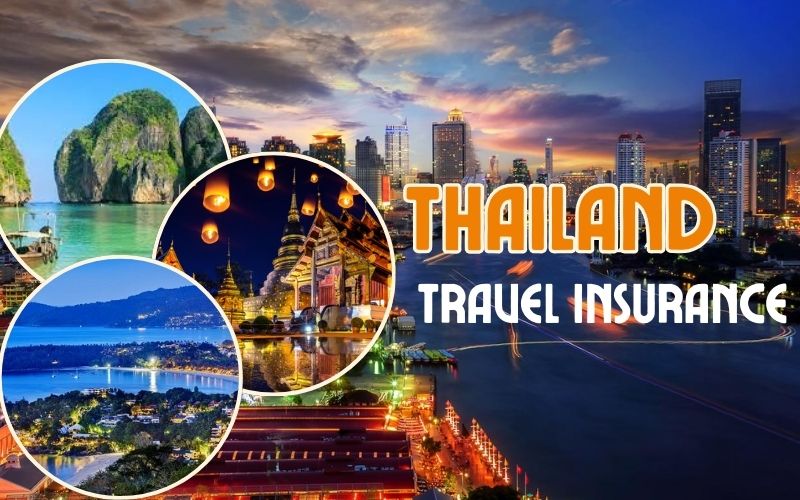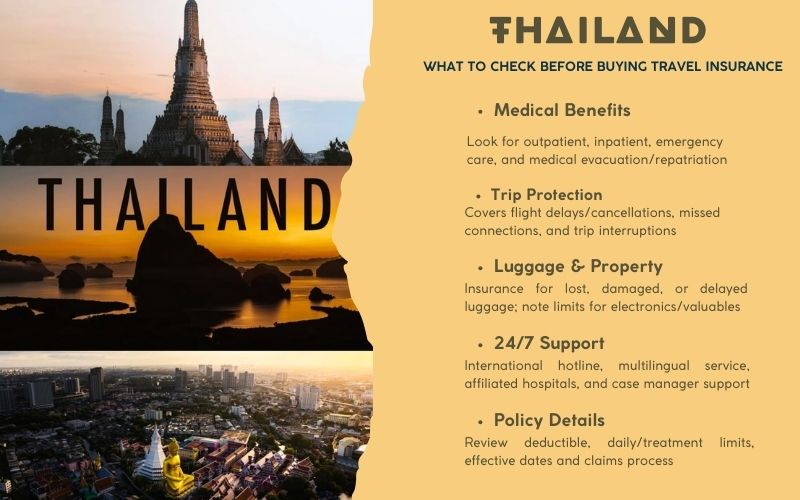
Thailand is also enticing due to its culture, food and nature; but travel risks (illness, accidents, delays, lost luggage etc.) can arise. A good Thailand travel insurance for foreigners will help cover medical expenses, provide 24/7 emergency assistance and minimize any financial loss for unplanned incidents during your trip.
Why Should You have Thailand Travel Insurance?
Travel to Thailand will be a lot safer and complete with a layer of financial protection for unpredictable risks. Choose a suitable package and meet its requirements can help you cover the hospital costs, medicine, emergency service, even medical transportation and repatriation if applicable.
Healthcare Coverage
From unexpected fever, heat stroke or food allergies in Bangkok to motorbike accidents in Phuket, medical expenses can quickly accumulate – Thailand medical insurance helps with hospital costs and medical transportation or repatriations in case of serious illness.
Trip Cancellation or Interruption
Events like weather, technical operational issues of flights, or personal emergencies can come up and disrupt your travel plans. Insurance allows you to be reimbursed for things like non-refundable flights or hotels and plans you paid for, so you do not lose your investment.
Lost, Damaged or Delayed Luggage
If your baggage is lost, damaged or delayed, travel insurance provides compensations and provides compensations and provides coverage for essentials like clothing, so you can worry less about it and have other issues to be concerned about on your trip .
Peace of Mind
Most importantly, travel insurance give you peace of mind and confidence in your travels. You have the complete freedom to enjoy Thailand, secure in knowing that if you are confronted with a emergency, you are covered.
Is Thailand travel insurance mandatory?
Currently there is no mandatory law to buy travel insurance before entering Thailand for most short-term visitors; however, it is strongly recommended that you purchase a policy to protect against medical costs, trip interruptions, and other unexpected expenses during your entire stay.
What is mandatory for entry in Thailand is that international visitors must have the appropriate visa (depending on nationality and length of stay) and, starting from 01 May 2025, according to the latest rules on entry regulations from Thailand, must also complete the Thailand Digital Arrival Card (TDAC) online within 3 days prior to entry.
It is important to note that TDAC is not a Visa, but rather an electronic entry card, which replaces the TM6 as the previously required entry document.
>>> Please visit our blog on Thailand Arrival Card for a deeper insight and information if this term is unclear to you.
What to check before you buy?

Checklist for a perfect Thailand Travel Insurance
When you start searching for the right Thailand travel insurance, ensure you start with the medical benefits: a good medical package typically includes outpatient, inpatient, emergency care, and medical evacuation/repatriation. Then carefully check the payment method, the limits for each item and the entire trip, as well as common exclusions (pre-existing conditions, cosmetic treatment, voluntary treatment, etc.). If you are planning to travel to Thailand with your family, choose a family package tour along with a family health insurance to save money and help combine benefits.
Next are the benefits for the trip: the insurance package covers in the event that the flight is delayed/cancelled, missed connection, or shortened the trip due to medical reasons/force majeure. Verify the activation conditions ( minimum delay times, legitimate reasons) and documents required ( airline confirmation, invoices for additional expenses, etc.). For luggage & property, there should be insurance for lost, damaged, delayed luggage; keep in mind the additional limits for electronics/valuables and documentation ( airline/police documentation).
An incredibly important aspect is the 24/7 support availability – you should favour the airline that has an international hotline, English/multilingual support, a network of affiliated hospitals to facilitate cashless payment, and a “case manager” support team to guide procedures. In respect of the activities, if you are going to scuba dive, zipline, trek or rent a motorbike, choose a travel insurance with sports coverage package and meets their safety requirements (wear a helmet, valid driving license, no drinking) as many packages do not have these activities built in automatically.
Finally, don’t forget about the deductible and what the deductible applies to, the limit of payments per day/treatment, the effective time (departure to return), and the claims process (deadlines to submit and documents needed including forms). Some insurance companies that service tourists travelling to Thailand that I know of: AXA Sawasdee, LMG Insurance, The Viriyah, Pacific Cross, Falcon, Thaivivat. Regardless of which insurance company you purchase from, read the terms carefully and purchase before your departure -that way all benefits will apply as you planned.
How to choose the right package?
Prioritize medical & baggage in big cites
If your goal is to “eat-play-shop-sightsee” in Bangkok, Chiang Mai, Pattaya, you should focus on medical and luggage/property benefits. The cost of international hospitals in large cities is quite high; so choose a wide enough medical limit and check if it covers hospital bills. With luggage, crowded cities are prone to loss/theft; read the limits for electronic devices, as they often have their own ceilings and require receipts.
>>> Discover Thai Street Food – Unveiling the Spice and Soul of Thailand to make your trip unforgettable.
Add adventure sports & weather protection
When the itinerary includes activities such as rafting, ziplining, trekking, kayaking, most basic packages do not cover them automatically. You can buy a rider for a wide range of sports/adventure activities. Even with a rider, caves often limit dive depths, require certified guides, protective equipment, and exclude alcohol consumption. Read the conditions carefully to avoid being turned away. In addition, the island is also at risk of cancellation or delay of trains and ferries due to weather, so you should keep your trip delay/ curtailment benefits intact.

Surfing in Phuket – Thailand
Verify license & third-party liability cover
In Thailand, renting motorbikes is very popular, but this is a risky area where compensation can easily be denied if you do not have a valid driver’s license. You should have a suitable driver’s license with an IDP – international driving permit, wear a helmet and do not drink alcohol. Many Thai travel insurance contracts do not cover damage when driving a motor vehicle yourself or only cover personal accidents but not third-party liability due to the driver. Therefore, you should:
- Prioritize buying insurance from the rental company to protect the vehicle body and third-party liability
- Check the terms of the travel insurance to see if it covers PA for the driver or companions? Are there any limits when the accident is due to driving yourself?
- If there is a Third-party Liability benefit in the travel package, read the exclusions carefully
Choose a regional plan for a multi-country trip
If you intend to travel to other countries during your trip, for example, to Singapore, Malaysia, Laos, Cambodia, Indonesia, etc. you should go with the regional plan (ASEAN or Asia) instead of just Thailand to avoid being “out of territory.” Insurance benefits for regional plans provide advantage to you in that the contract gives coverage for the entire route by air, boat, and road for the whole trip; however the price may be a little above the single Thailand travel coverage.
- Some notes when selecting regional insurance:
- Make sure all the countries on the itinerary are covered, review the exclusionary clause by territory
- The effective date covers the entire itinerary,(including transit overnight transit.)
- Put trip interruption/curtailment benefits first in situations where part of the travel itinerary is subject to interruption due to an event in one country, which affects the rest of the itinerary.
- If a sports rider travels as part of an adventure tour in another country, then the rider must be valid throughout the country or region
>>> Check out Vietnam & Thailand 13 Days Vacation tour for an inspiring multi-country journey that lets you explore the highlights of both nations in one seamless itinerary
Consider an annual multi-trip package
If you go to Thailand or plan many short trips throughout the year, you may want annual multi-trip insurance. This insurance usually covers unlimited trips for 12 months, but there may be restrictions on the maximum number of days for each trip.
The advantage of this type of insurance is that it is convenient, there is no need to purchase each trip separately, and if you are doing 2 or 3 trips or more a year, may sometimes be a better value.
- A few key things to pay attention for under this type of insurance is:
- Make sure to check the max days per trip to ensure it meets your normal travel habits.
- Make sure that medical, luggage, cancellation/delay benefits equivalent to the single-trip package, which you use on a regular basis.
- If you frequently engage in water activities or trekking, check that you can attach the sports rider as a whole year option and not restricted by country (If you travel outside Thailand).
- Regularly update the beneficiary and destination details so the company may recommend the appropriate package.
An appropriate Thailand travel insurance policy will keep you protected against risks large and small – from hospital fees to luggage and travel mishaps. Make sure you choose enough medical coverage at international hospitals, check to make sure the sports rider is on if you‘re diving/ziplining, examine the exclusions meticulously – and buy before you go so your benefits are in play. Save the 24/7 hotline, retain the original receipt, and prepare an e-policy – so you can claim back your money as soon as possible if you need to. Wishing you a safe and enjoyable trip to Thailand!
Read more:




I appreciate the thorough breakdown, but I am still unclear on one point. For short leisure trips of one or two weeks, is it genuinely necessary to purchase a comprehensive policy, or would a basic medical-only plan be sufficient if one is not engaging in high-risk activities?
That is a fair question and one many travelers ask. In purely theoretical terms, a medical-only plan could work if your itinerary is extremely simple and flexible. However, in practice, most losses travelers experience in Thailand are not limited to hospital bills. Flight delays, missed connections, or luggage issues are surprisingly common, especially during peak season or monsoon months. A comprehensive plan usually costs only marginally more, but it protects the total financial value of your trip, not just your health.